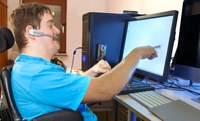Over 12 millions Swiss francs for more inclusive ICT
A simplified version of a text, a translation or an assessment in sign language, an audio description or subtitles are essential tools for many people. Despite the increase of communication channels, inclusive approaches are still a challenge. Therefore, the projects gathers several state of the art scientific partners, such as the University of Zurich, the University of Applied Sciences of Special Needs Education, the University of Surrey and, on the French speaking part of Switzerland, Idiap research Institute and Icare research institute.
Complementary skills
“At Idiap, we are not only specializing in spoken language processing but also in sign language processing. In this project, we will bring in both those expertise for development of sign language assessment application that assists online sign language learning and spoken subtitles application,” Mathew Magimai-Doss, senior researcher in the Speech & Processing Group, explains. “With tools such as machine learning, we could, for example, apply a more straight forward approach to text simplification for people with mental disabilities. Currently, text simplification processes implies numerous and complex iterative rules,” Julien Torrent, Innovation Manager at Icare research institute, explains.
Beyond scientific research, the aim is to develop transversal tools that can be used with different platforms and adapted to users’ needs. Applications are ranging from information about natural disasters to official document access. To make it possible, it is necessary, for example, to have a simplified—understandable—version of a text, while keeping its meaning, or to create an accurate audio or sign language subtitle for pictures. These are some of the scientific and technological challenges ahead.
Technology implementation thanks to public and private partners
Not only limited to academia, this project includes several partners in charge of the practical implementation of the developed technologies. In collaborations with the Swiss Federation for Deaf People, many federal actors are involved, like the Federal Bureau for the Equality of People with Disabilities, Swiss TXT (Swiss Broadcasting), the Federal Social Insurance Office, the Federal Office of Public Health, the Federal Office for Civil Protection, and MeteoSwiss. The private insurance company Zurich and the Austrian company Capito, that creates simplified texts, are also associated with the project. The aim? Easier access to communication of essential information to disabled people.
The project will start in 2022 and will last four years under the Innosuisse’s Flagship Initiative, which goal is to support systemic innovation. The project is among those selected following the first call in January 2021.
More information
- Groupe de recherche traitement du son et de la parole de l’Idiap
- Innosuisse Flagship Initiative
